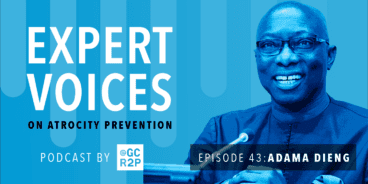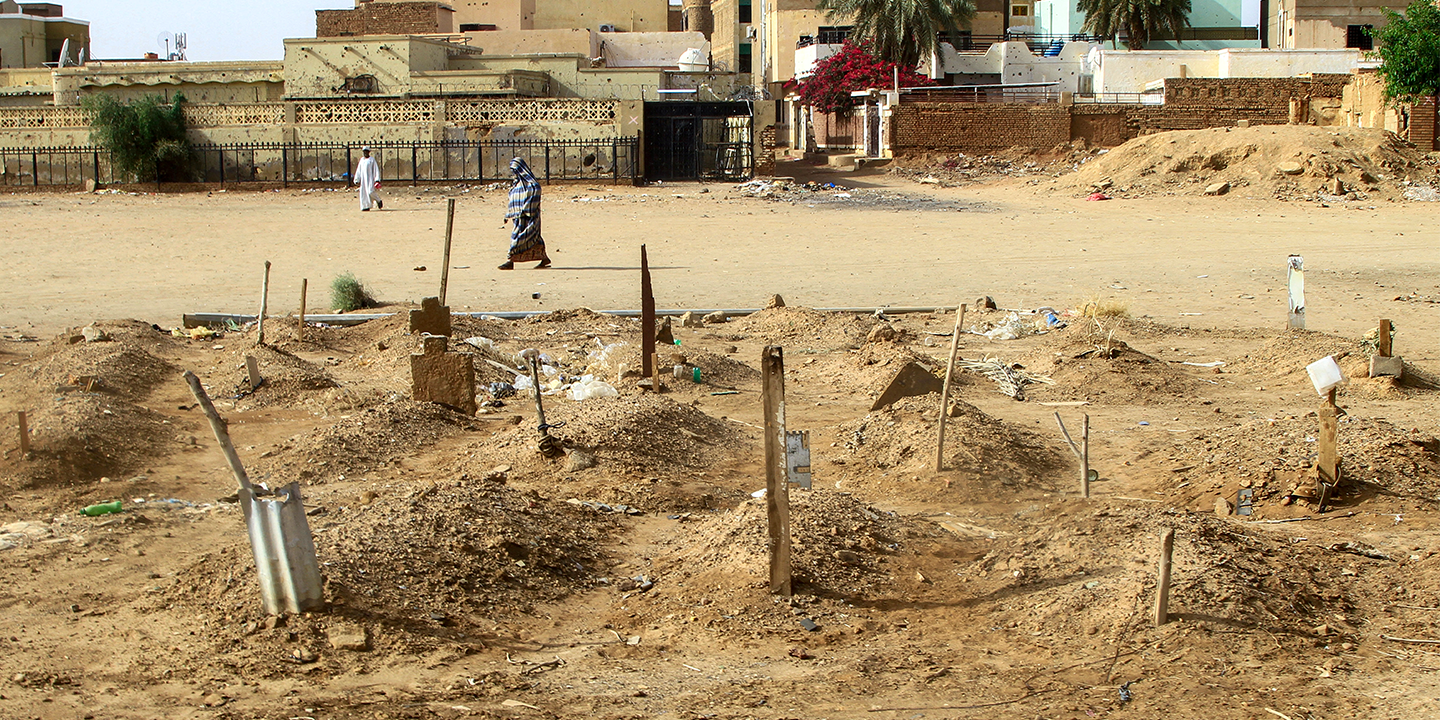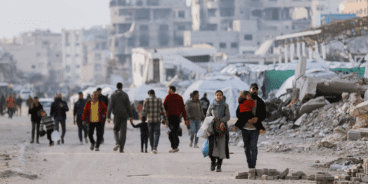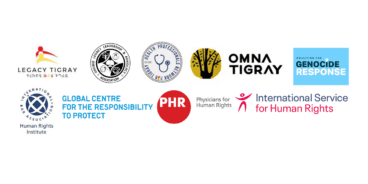

Atrocity Alert No. 434: Sudan, Ethiopia and the UN Human Rights Council
Atrocity Alert is a weekly publication by the Global Centre for the Responsibility to Protect highlighting situations where populations are at risk of, or are enduring, mass atrocity crimes.
WIDESPREAD CIVILIAN EXECUTIONS AFTER SUDANESE ARMED FORCES RECAPTURE KHARTOUM
Since 26 March alarming reports have emerged of widespread extrajudicial and summary executions targeting civilians in the southern and eastern areas of Sudan’s capital, Khartoum, following the recapture of the city by the Sudanese Armed Forces (SAF). The Office of the UN High Commissioner for Human Rights (OHCHR) has analyzed disturbing videos shared on social media, showing armed individuals – some wearing military uniforms, others in civilian attire – deliberately executing civilians, often in broad daylight and public spaces. In one incident, at least 20 civilians were allegedly killed by the SAF and SAF-affiliated militias in the Janoub Al Hezam area of southern Khartoum. In some videos the armed individuals claim their actions are retribution against those they accuse of supporting the paramilitary Rapid Support Forces (RSF). Additionally, OHCHR reported that lists of individuals accused of collaborating with the RSF have been posted online.
The majority of killings have been attributed to the SAF, state security personnel and SAF-affiliated militias. In a press release on 3 April, UN High Commissioner for Human Rights Volker Türk stated that he is “utterly appalled by the credible reports of numerous incidents of summary executions of civilians in several areas of Khartoum” and underlined that “extrajudicial killings are serious violations of international human rights and humanitarian law.” Despite the SAF and RSF both actively seeking greater legitimacy from the international community, the continued violations of International Humanitarian Law (IHL) and International Human Rights Law (IHRL) by both sides cannot be overlooked or normalized in the pursuit of diplomatic engagement.
The latest developments in Khartoum underscore the urgent need for coordinated international action to address the escalating crisis in Sudan. The ministerial meeting on Sudan, scheduled for 15 April in London – which also marks the second anniversary of the conflict – presents a crucial moment for governments to recalibrate the global response to the conflict.
While condemning atrocities and pledging humanitarian assistance is essential, the meeting must prioritize the meaningful protection of civilians as a core political objective. This requires addressing the root causes of violence, patterns of impunity and the power dynamics sustaining the conflict. For any peace effort to be sustainable, it must go beyond short-term deals between the warring parties and involve close collaboration with a broader range of stakeholders – including civil society, local communities and marginalized groups. Only through a genuinely inclusive process can Sudan move toward lasting peace, rather than settling for fragile arrangements that risk entrenching impunity and fueling future instability.
The SAF must immediately halt the summary and extrajudicial executions of civilians and ensure that those responsible for unlawful killings and other violations are identified and prosecuted through fair and transparent processes that meet international standards. All armed actors in Sudan must adhere to IHRL and IHL.
JUSTICE INCHES FORWARD FOR PAST ATROCITIES IN ETHIOPIA AMID ONGOING ABUSES
On 3 April the High Court of Kenya ruled that it had jurisdiction to hear a case brought against Meta, the parent company of Facebook, over allegations that the social media platform contributed to ethnic violence and killings of civilians during the war in Ethiopia’s northern Tigray region from November 2020-2022. The case was filed by the Katiba Institute on behalf of Abrham Meareg, whose father was killed following targeted hate speech and the release of personal information, and Fisseha Tekle, a former Amnesty International researcher who was also the target of online hate campaigns for his work. The plaintiffs claim that Facebook ignored warnings about incitement to violence on its platform and are seeking a $2.4 billion restitution fund for victims.
Meanwhile, other legal efforts aimed at seeking justice for atrocities committed during the Tigray conflict are underway. On 20 March Legal Action Worldwide, in partnership with Debevoise and Plimpton LLP, announced that it had filed a complaint with the German Federal Public Prosecutor on behalf of eight survivors of the conflict. The complaint, filed in September 2024, alleges that 12 senior Ethiopian and Eritrean government and military officials committed war crimes and crimes against humanity. During the conflict the UN documented war crimes and crimes against humanity, while Amnesty International and Human Rights Watch found evidence of ethnic cleansing of Tigrayans from Western Tigray by Ethiopian regional and federal forces alongside Eritrean forces.
While these legal processes are crucial for accountability, the human rights and protection situation remains dire. Abuses continue in Tigray, including abductions, rape, looting and arbitrary arrests by Eritrean forces. Additionally, tensions within Tigray’s main political party and deteriorating relations between Ethiopia and Eritrea, fueled by inflammatory rhetoric, threaten to push both countries toward conflict.
Reports of abuses extend beyond Tigray. In Ethiopia’s Amhara region, a two-year-long conflict has been marked by ethnic-based targeting and killings, attacks on healthcare and humanitarian workers and mass arbitrary arrests by federal government forces in pursuit of ethnic Amhara militia groups known as the Fano. In the Oromia region, federal forces have been accused of committing extrajudicial executions, enforced disappearances and ethnic-based killings as part of a years-long counterinsurgency campaign against the Oromo Liberation Army militia.
Sarah Hunter, Horn of Africa expert at the Global Centre for the Responsibility to Protect, said, “While legal efforts to seek justice for the victims of atrocities in Ethiopia are underway, it is equally vital to document the ongoing abuses and take immediate action to halt them. The international community should pursue universal jurisdiction cases as part of a broader strategy for atrocity prevention, while also pressing Ethiopian authorities to advance peace and confidence-building efforts to ensure long-term protection and stability for civilians nationwide.”
OUTCOMES OF THE 58TH SESSION OF THE UN HUMAN RIGHTS COUNCIL
Last Friday, 4 April, the UN Human Rights Council (HRC) concluded its 58th session in Geneva. During the nearly six-week session, which started on 24 February, UN member states addressed and acted on several atrocity crises around the world and renewed numerous reporting, documentation and investigative mandates that are critical to atrocity prevention and accountability.
On 2 April the HRC renewed the mandate of the Commission on Human Rights in South Sudan (CHRSS) while emphasizing that “the Government of South Sudan has the responsibility to protect its population from genocide, war crimes, ethnic cleansing and crimes against humanity.” Ongoing investigations by the CHRSS will be vital as South Sudan remains at risk of relapsing into country-wide conflict. UN member states also extended the Commission of Inquiry on the Syrian Arab Republic as numerous challenges – including rising tensions, instability and ongoing hostilities in parts of Syria – are testing the country’s fragile transition process.
Under the leadership of a group of regional countries, on 3 April the HRC extended the mandate of the Group of Human Rights Experts on Nicaragua (GHREN) for two years, requesting the GHREN to present its findings to the UN General Assembly in New York in response to the government’s announcement on 27 February to withdraw from the HRC. The same day as the resolution was adopted, the GHREN released a groundbreaking report identifying 54 government, military and ruling party officials responsible for crimes against humanity and other systematic and grave human rights violations and abuses.
The HRC also renewed the Commission of Inquiry on Ukraine, the Special Rapporteurs on the Democratic People’s Republic of Korea and Myanmar (Burma), the UN High Commissioner’s Designated Expert on Haiti and the Independent Expert on the situation of human rights in Mali.
During a panel discussion on early warning and genocide prevention on 5 March, the Executive Director of the Global Centre for the Responsibility to Protect, Savita Pawnday, addressed the HRC, warning that, “the selective response to atrocity crises – from Gaza to Ukraine, Myanmar, Sudan, Ethiopia or China – erodes the credibility of the multilateral system created to protect populations from atrocity crimes.” Australia delivered a statement on behalf of the Group of Friends of the Responsibility to Protect to highlight the critical role the UN human rights system plays in preventing and responding to atrocity crimes.
Building on this, we continue to call on all UN member states to commit to principled positions on crisis situations, bridging institutional divides and embedding the perspectives of affected communities at the heart of decision-making at the HRC.
Related Content


